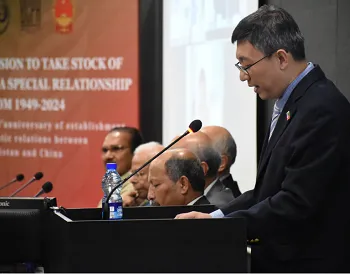On Monday, May 20, 2024, BCPR and the China Studies Chair at BNU organized the "Panel Discussion to Take Stock of Pakistan-China Special Relationship from 1949-2024" to commemorate the 73rd anniversary of the establishment of diplomatic relations between Pakistan and China.

Speakers included Ambassador Mansoor Ahmad Khan, Head of the Initiative on Pakistan’s Place in the World at the BCPR; Dr. Moeed Yusuf, VC BNU; Deputy Chinese Consul General H.E. Cao Ke; Senator Mushahid Hussain Syed; Dr. Ishrat Hussain, member of the Board of Governors of BNU and former Governor of the State Bank of Pakistan; Ambassador Moin ul Haque, former Ambassador of Pakistan to China and Mongolia; Dr. Zafar Mehmood, former Special Envoy for China Pakistan Economic Corridor; Professor Tang Jun, Director of the Pakistan Research Center at Inner Mongolia Honder College of Arts and Sciences in China; and Ambassador Zhang Chunxiang, former Ambassador of Pakistan to China. The event featured a lively exchange of ideas about Pakistan and China’s close diplomatic relations and support of each other in times of geopolitical crisis. The session opened with introductory remarks by Dr. Moeed Yusuf, who noted that the BNU’s establishment of a China Studies Chair is no small feat and that it is a unique project in Pakistan. Following Dr. Yusuf’s remarks, the Deputy Chinese Consul General H.E. Cao Ke delivered an address in which he compared the relationship between Pakistan and China as of gold partners while highlighting the benefits of cooperation between the two countries. He further noted that Pakistan has been a staunch supporter of the One China Policy. H.E. Cao also emphasised that the youth of both countries is the way forward for both of them, so it is important to focus on the narrative building for this generation to assure the longevity of the friendly ties between the two countries. Senator Mushahid Hussain then delivered his keynote address in which he regarded the bond between the two countries as an iron bond. He appreciated Chinese support to Pakistan through thick and thin, and how both countries have been supporting each other. He underlined how Chinese support to Pakistan does not come with Chinese interference in the internal affairs of Pakistan. He argued that Pakistan needs to provide foolproof security to the Chinese personnel working in the country and ensure political stability in Pakistan with consistent policies to facilitate Chinese support of Pakistan. Following the keynote address by Senator Mushahid Hussain, the panelists shared their views on the way forward for Pakistan-China relations and discussed how Pakistan must fix its internal processes to take better advantage of this partnership. Dr. Ishrat Hussain corroborated Senator Hussain’s view that China has been the only country which has supported Pakistan without proposing excessive restrictions on the latter. Dr. Ishrat Hussain further argued that Pakistan has lacked in areas which has created a gap between the two countries. To fill in these gaps, Pakistan should focus on the development of special economic zones (SEZs), and the removal of hindrances to Chinese capital investments. Ambassador Moin ul Haque followed Dr. Hussain’s remarks by sharing that Pakistan and China are colloquially called ‘Baatiye’ i.e., iron brothers in China, which is a marker of Chinese warmth towards Pakistanis. He noted that the relationship between both countries is robust and deep, and they have supported each other on geopolitical issues and lent constant support at international platforms, while encouraging the development of an economic partnership. This is in conjunction with their cooperation in the defense, space, financial and banking, and academic and educational spheres through people to people exchanges. Dr. Zafar Mehmood followed Ambassador Moin ul Haq’s intervention by expressing that Pakistan has unfortunately failed to learn from the development of China and that Pakistanis must focus on learning the Chinese language to be more inclusive, and understanding China’s development trajectory to kickstart development in Pakistan. Professor Tang Jun provided the Chinese perspective on the link between two countries through academia, education and research by emphasising that education, research, and people-to-people exchanges are the cornerstone of the Pakistan-China relationship. He expressed his delight at the increasing number Pakistani students in China. He further added a that think tank collaboration is a milestone that needs to be achieved. The last panelist for the session, Ambassador Zhang Chunxiang remarked upon his interactions with Pakistan. Ambassador Zhang quoted that both the countries are Baatiye i.e., iron brothers. He added that while both countries have been supporting each other, their relationship came under pressure in the 1950s, but from the 1960’s onwards, both countries have worked on mutual trust and beneficial cooperation. Ambassador Zhang Chunxiang noted Pakistan’s support on the India-China border issue, CPEC and mentioned more instances where both countries backed each other at international platforms. The panel discussion ended after an engaging question-and-answer session with the guests.
13 KM Off Thokar Niazbeg - Raiwind Road, Tarogil, Lahore - 53700, Pakistan

